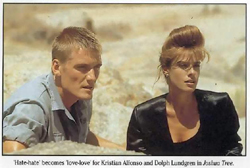
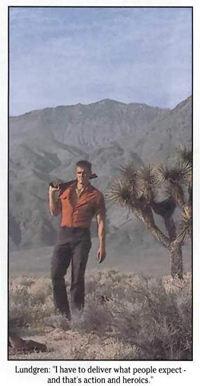
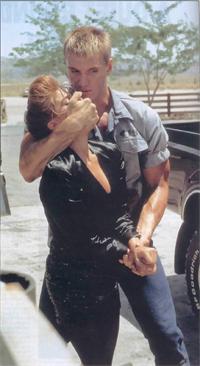
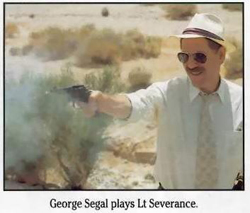
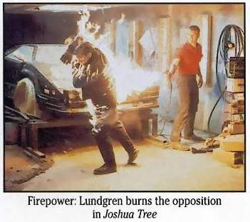 |
A Quiet Round
of Dolph
by Jenny Cooney, Preview,
Cannes Special May 1993
Action star Dolph Lundgren's
present work schedule is almost as punishing as the part he plays
in the upcoming Vision release, Joshua Tree. But, visiting
him in the comparative calm of his office, Jenny Cooney found
the actor in reflective mood.
It is hard to imagine a desk-bound
Dolph Lundgren working as a chemical engineer. Even in his modest
West Hollywood office, the 33-year-old actor avoids talking over
the desk and prefers to settle in a more casual chair in the
corner of the room.
"Dolph was once a chemical engineer ," he acknowledges,
briefly referring to himself in the third person, "who was
grooming his life to make money and support a family by using
his brain rather than his body. That was the plan when I started
out," he continues, switching to a less impersonal tone.
"Now I'm not doing that any more, I like to think I'm still
using my brain instead of my body to get what I want. But, on
screen, it's usually the other way around."
Despite his academic background (which includes a Master's degree
in chemical engineering from the University of New South Wales
in Sydney, Australia, and the winning of a Fulbright Scholarship
to study at the Massachusetts Institute of Technology), the Swedish-born
Lundgren is now one of Hollywood's most popular action stars.
He has mixed feelings about this. "I always look for a character
who could show a few more aspects of myself that people haven't
seen," explains the actor. "But, at the same time,
I have to deliver what people expect - and that's action and
heroics." The process began with a bit part in the James
Bond movie, A View to a Kill, offered to him through his
former fiancee, singer/actress Grace Jones, who starred in the
film. His big break, however, came with Rocky IV in 1985,
after which his career took off.
Since then, Lundgren has taken a fairly conventional action-hero
route, with films such as Masters of the Universe, Red
Scorpion, Dark Angel (aka I Come in Peace),
Showdown in Little Tokyo (with the late Brandon Lee, for
whom he was ordering memorial flowers just before the present
interview took place) and last year's hit, Universal Soldier,
which pitted him bicep-to-bicep against Jean Claude Van Damme,
his main competitor in the genre. Now, in the calm of his office
- which bears the name of Red Orm Productions, after a Viking
character in one of his favourite Swedish books - Lundgren is
talking about his next film, a modern-day western called Joshua
Tree, released by Vision International, and the two films
on which he is about to start working back-to-back: Pentathlon,
in which he plays a defecting East German Olympic athlete who
encounters members of his old country's secret police currently
planning his demise in the US; and Men of War, which will
be his third Vision International release (Dark Angel
was the first). Talks are currently in progress for Lundgren
to star in a fourth Vision picture: apparently the actor's relationship
with Vision chairman Mark Damon has been a happy one.
In Men of War - the first action movie to be written by
John Sayles, the acclaimed writer/director of such films as Passion
Fish and City of Hope - he plays a character who leads
a group of mercenaries to a South Pacific island to get rid of
some natives who are refusing to sell their lucrative mineral
rights to a large corporation. He ends up defending the natives
instead.
Joshua Tree, on the other hand, "shows a dark side
to my character, which was what 1 was looking for: a different
kind of role," explains Lundgren. "My character is
accused of killing a police officer. He takes a woman hostage
after escaping and she becomes his unwilling partner. She turns
out to be a local sheriff's deputy, and they develop a hate-hate
turning to love-hate turning to love-Iove relationship as she
realises he's innocent."
In many respects, Lundgren's rise seems like a sequel to that
of Arnold Schwarzenegger. He speaks five languages, is six foot
five and was an international karate champion before he turned
his back on the scholarship and decided to take a shot at acting.
Keenly aware of his image, Lundgren does not push himself into
genres where he knows his audience will not be able to follow.
"Being compared to Arnold is flattering," he admits,
"because people know it's possible for somebody who is physically
big and was an athlete to do as well as someone who comes out
of a total acting background. But, when people try to put you
on the same career path, that's tough. Everyone is unique, and
you have to trust your own instincts and your own destiny and
what you think is unique about yourself - even though I don't
quite know what it is yet!"
What Lundgren does know, however, is the battle he has had to
find his own niche in Hollywood. "Obviously I'm a physical
person," he acknowledges, "and making a lot of action/adventure
movies will be my main type of work. But I do like acting and
doing dramatic work. Maybe instead of being a charismatic, personality-type
actor, I could be an actor/movie star, not a showman movie star
.
"I'm more private and shy and vulnerable than people think,"
he adds: "more so than other actors in my genre. And I'm
trying to use that in my roles and not be afraid of that part
of me. Because, if you combine [those characteristics], you get
a classic adventure-type leading man from the Forties. I've made
it by playing tough and assertive and being over-qualified and
knowing everything and being born to be a hero and never being
scared... lf I keep going that way, I'll never get where I want
to go with my career."
Lundgren's sparsely-furnished office, which features a black-and-white
still of Audrey Hepburn in Breakfast at Tiffany's mounted
on one wall and a framed photo of him with his karate team in
front of the Sydney Harbour Bridge on the other , sheds only
a little light on the personality behind the actor. But its very-
existence testifies to Lundgren's new business-like approach
to his job.
"In my twenties," he says with a grin, "I had
some goals. But I'd make a movie and go to Paris and have fun
until I got tired of that and then I'd come back and find another
movie. Now, I'm a little more focused. I'm determined to have
an office so I start feeling grown-up. The security of my office
balances the insecurity of the business. Working on the set and
as an actor, you're always insecure: that's the fuel you work
from. That you always have to go into the unknown as an actor
makes it good to have something stable here to come into work
to every day."
Lundgren is disarmingly modest about where he is heading. "I
can't even imagine what it must be like being a really, really
big star like Mel Gibson," he says. "I feel I would
like to get used to this level first, and then slowly move on
to the next when I know how to deal with this one." Judging
by his incessant work schedule, the move may come less slowly
than he thinks.
-
-
|



